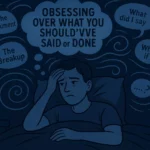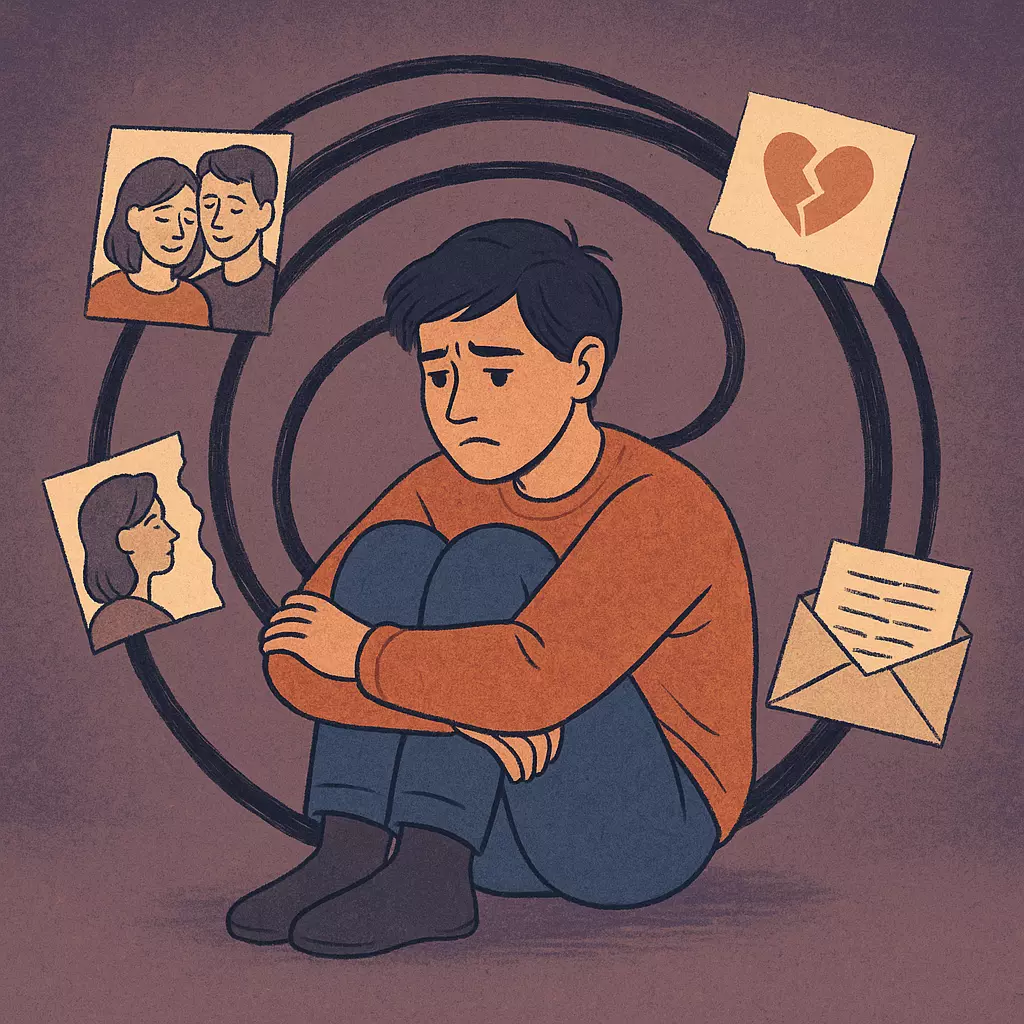Table of Contents
It starts as a memory. Just one. The last thing they said. The curve of a smile you used to wake up beside. You don’t mean to remember it—but you do. Then come the questions. What if I had stayed? What if I hadn’t said that? What if they never loved me at all?
Suddenly, you’re not in your present life anymore. You’re back there. In the echo. In the loss. In the endless loop.
This isn’t just grief. It’s something deeper. Something stickier. Something that won’t let go even when you desperately want it to.
This is the hell of breakup rumination—and it’s more than just overthinking. It’s a pattern that can start to feel like an addiction. Not to the person. To the pain.
Why Can’t I Stop Thinking About My Ex?
You probably already know it’s over. Your friends know it. Your calendar knows it. And yet, your mind won’t stop replaying the story.
That’s because romantic rejection doesn’t just break your heart—it activates the same neural pathways as physical pain.
According to a 2025 study by Mancone and colleagues, this pain can spiral into a repetitive loop of thoughts, especially in young adults, damaging not only emotional well-being but also physical health and daily functioning.
The brain searches for meaning in the loss, hoping that if it just replays the moment enough times, it will find closure. But often, it doesn’t. Instead, it strengthens the pathway of pain—like a needle wearing a groove into vinyl.
This breakup rumination becomes a habit. And habits, even painful ones, are hard to break.

Can You Be Addicted to Heartbreak?
Yes. But maybe not in the way you think.
You’re not addicted to hurting. You’re addicted to the clarity it brings. When everything else feels uncertain, the pain of heartbreak feels solid. Reliable. Known.
You know what it means to miss them. You know how it aches. And in a world that’s moved on without them, that ache becomes the last thing connecting you.
Psychologists call this “brooding rumination”—a passive, self-critical thought pattern that turns sorrow into a cycle. In a 2025 study led by Verhallen et al., this type of rumination was shown to prolong depression after a breakup, delaying recovery and entrenching emotional pain.
Even worse, Brosschot and Ottaviani’s research shows that this loop isn’t just mental—it’s physical. Breakup rumination activates the body’s stress systems: elevated heart rate, cortisol spikes, disrupted sleep. It’s like your entire body is reliving the trauma on a loop.
So no, you’re not crazy. You’re caught. And that’s exactly why you need a way out.

Why Breakups Hurt So Much (Science of Heartbreak & Healing)
Let’s examine breakups in: Biology of love & loss, Attachment styles, Rejection psychology, Closure, Rumination, Grief
Tap here to read more →How Do I Break the Thought Loop of Breakup Rumination?
First: stop judging yourself for being stuck. Breakup rumination isn’t a character flaw—it’s a coping mechanism. A misguided one, yes. But not a failure.
The good news? There’s a way through. And it starts with changing the type of rumination you engage in.
Brooding rumination is passive. It asks “Why me?” and “What did I do wrong?” Reflective rumination, on the other hand, is active. It asks “What can I learn?” and “What do I want now?”
By shifting the tone of your inner dialogue, you start turning the mental loop into a ladder. One that actually leads somewhere new.
Studies show that reflection—paired with mindfulness, journaling, and grounded self-compassion—can interrupt the feedback loop. Instead of being dragged by your thoughts, you start to observe them. Question them. Eventually, release them.
You’re not erasing the past. You’re unhooking from it. Thought by thought. Breath by breath.

And So, a Gentle Truth
Heartbreak is not just something you survive. It’s something you unlearn. You unlearn the loops. The false certainty. The ache that pretends to be love.
And in its place, you make room—for clarity, for peace, for something that doesn’t hurt to hold.
Letting go isn’t forgetting. It’s remembering differently.
And maybe, just maybe, that’s how healing begins.
FAQ
Q1. Why do I keep thinking about my ex even though I want to move on?
This is often due to breakup rumination, a mental loop where your brain replays the relationship and its end in an attempt to make sense of the pain. It’s your mind trying to find closure but getting stuck in repetition instead.
Q2. Can you be addicted to the pain of a breakup?
Yes—research shows that rumination can activate the brain’s reward and stress circuits, creating a loop of emotional pain that feels compulsive. This isn’t addiction to suffering itself, but to the certainty the pain provides.
Q3. What’s the difference between brooding and reflective rumination?
Brooding rumination is passive and self-critical, often keeping you stuck in ‘what if’ thinking. Reflective rumination, on the other hand, is more constructive—it focuses on learning from the experience and moving forward.
Q4. How can I stop breakup rumination?
Interrupt the loop by practicing mindfulness, journaling with a future-focused lens, and using tools like CBT or somatic grounding. Shifting from brooding to reflective thinking can help your brain transition out of survival mode and into healing.
Scientific Sources
-
S. Mancone et al. (2025): Emotional and cognitive responses to romantic breakups in Italian young adults
Key Finding: Rumination predicted poorer academic performance and physical health; avoidance coping mediated its link to emotional distress.
Why Relevant: Connects breakup rumination to negative real-world outcomes, showing how thought loops damage well-being.
https://www.ncbi.nlm.nih.gov/pmc/articles/PMC11985774/ -
A. M. Verhallen et al. (2025): Depressive symptom trajectory following romantic relationship breakup and effects of rumination, neuroticism, and cognitive control
Key Finding: Brooding rumination prolongs distress, while reflective rumination supports emotional growth.
Why Relevant: Explains how certain types of rumination can trap people in emotional pain while others may help healing.
https://www.researchgate.net/publication/357160345 -
J. F. Brosschot, C. Ottaviani et al. (2025): Perseverative cognition (repeated thinking about negative events)
Key Finding: Persistent negative thinking triggers long-term physiological stress responses affecting health.
Why Relevant: Demonstrates how breakup rumination isn’t just emotional—it takes a physical toll too.
https://en.wikipedia.org/wiki/Perseverative_cognition
- Soothing the Spiral: Grounding Techniques for Breakup Rumination That Really Work

- Breakup Rumination Trap: Why You Stalk Their Socials (and How to Stop)

- Powerful CBT for Rumination: Break Free from Heartbreak Loops

- Breakup Rumination: Why You Can’t Stop Thinking About the Pain of the Past

- Breakup Rumination Hell: How to Escape the Pain Loop for Good

- Powerful Writing Therapy for Rumination: Find Peace After Heartbreak

- Breakup Rumination Relief: Powerful Ways to Interrupt the Thought Spiral

- Dopamine and Breakup Rumination: The Surprising Science Behind Why You Can’t Stop Thinking About Your Ex

- Breakup Rumination: The Powerful Truth About Why You Can’t Stop Thinking About Them


Leave a Reply